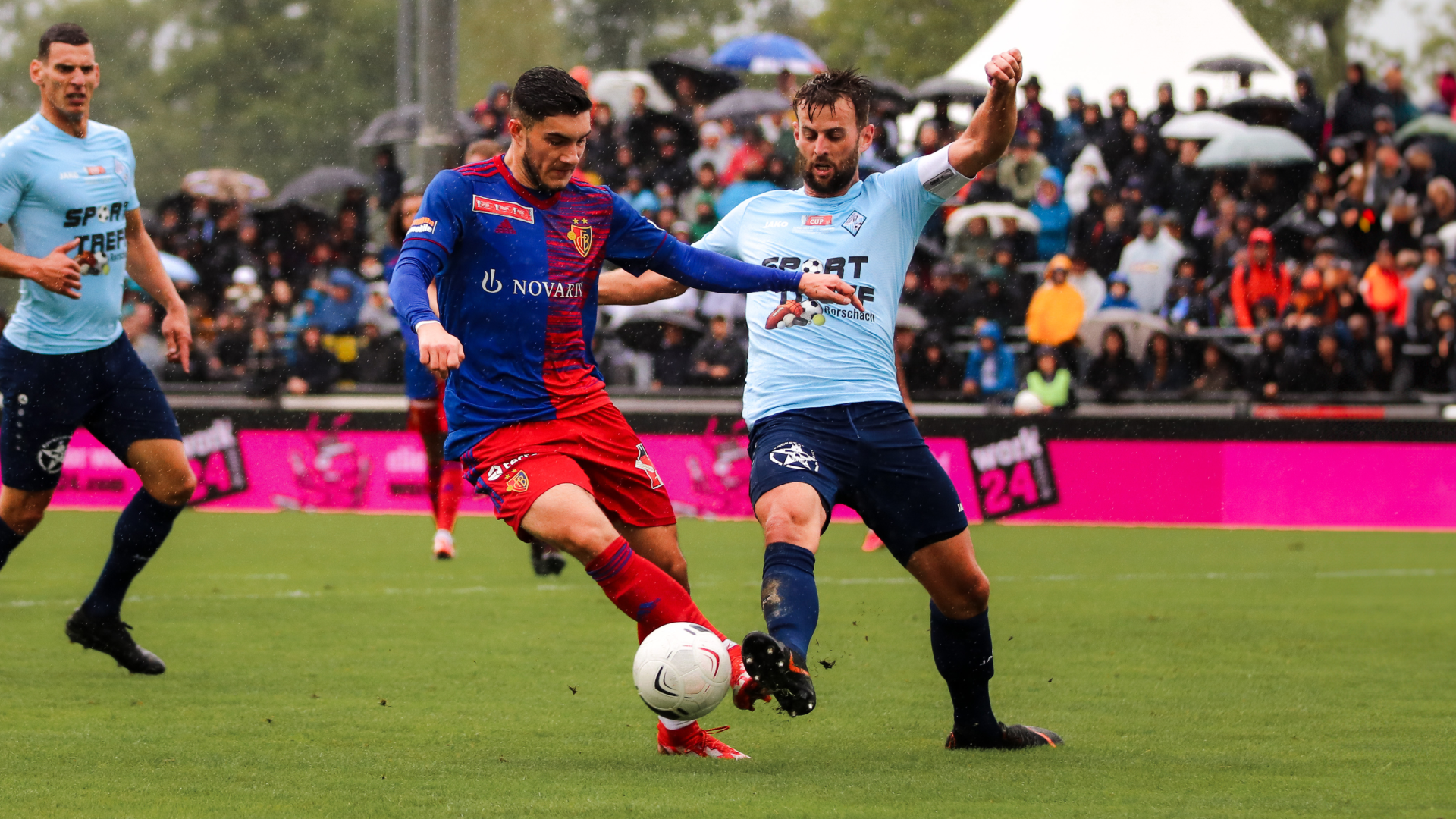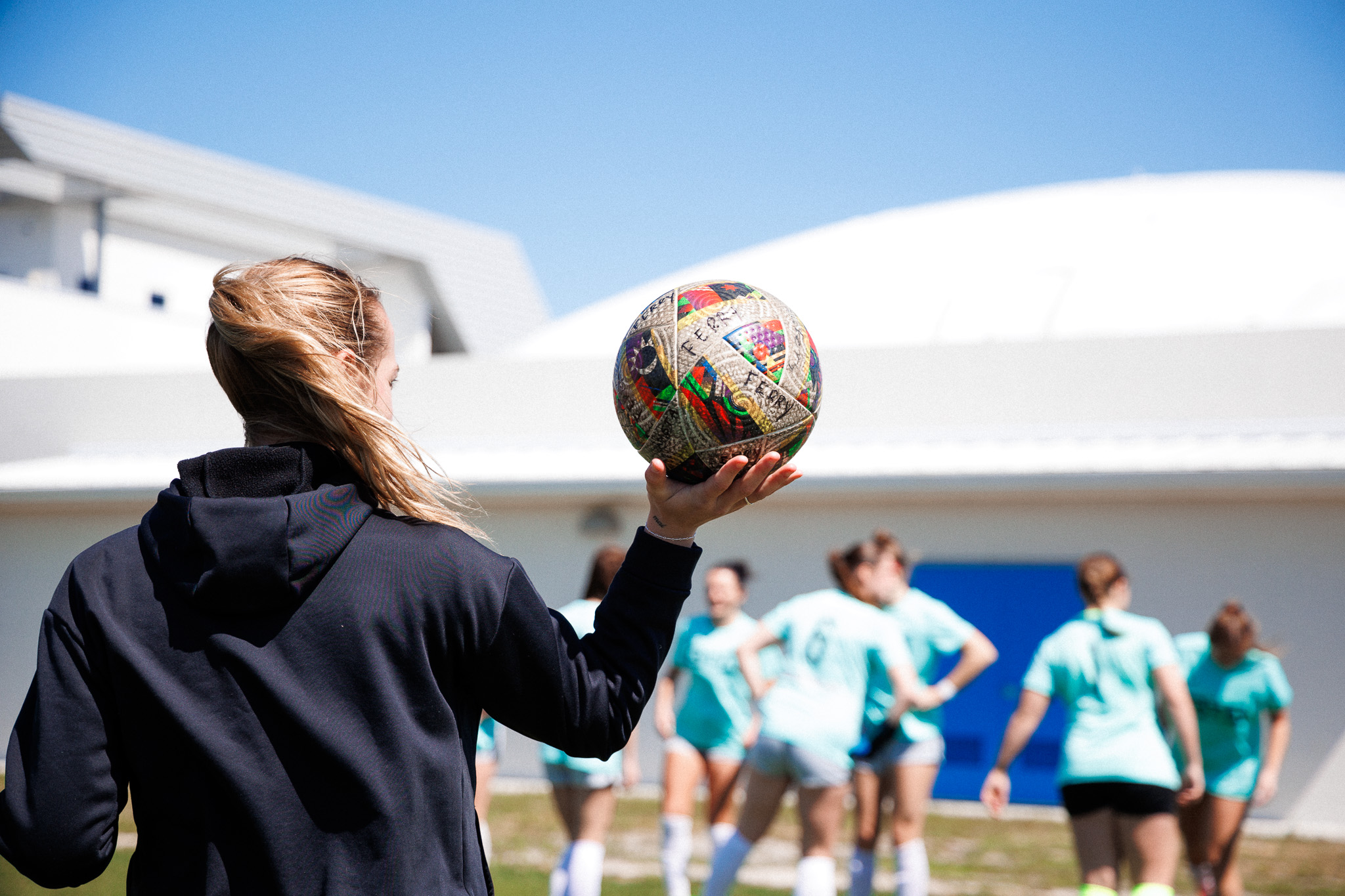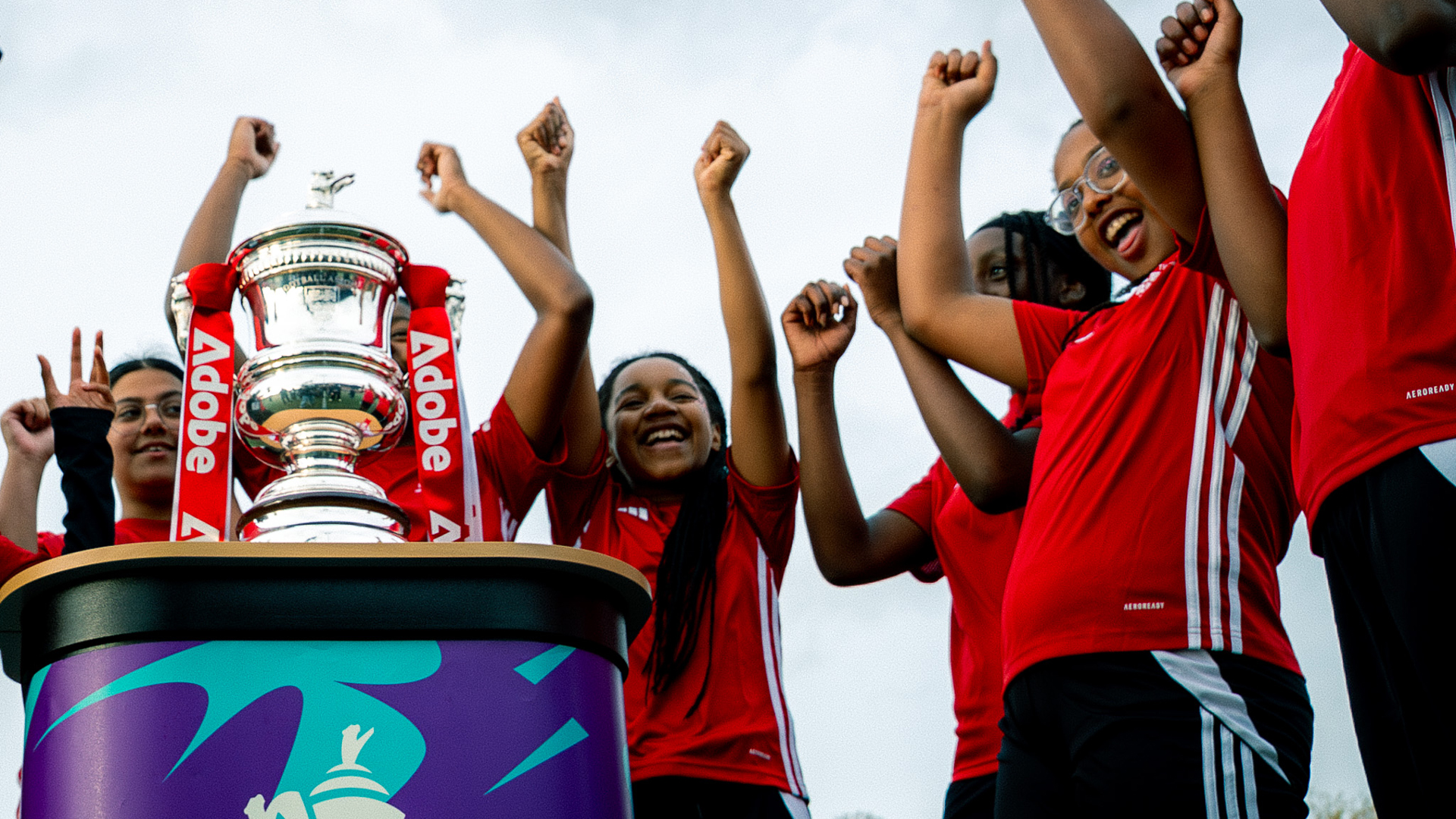Coach Kelly: Cultivating Champions Through Innovation and Empathy
Frederik Hvillum

After a playing career at Arsenal and Reading, British coach Kelly Sims has found her calling in developing young talent in New Jersey, where she's revolutionizing youth football through constraint-based coaching and emotional intelligence.
In a modest apartment in New Jersey, surrounded by football memorabilia, Kelly Sims reflects on a journey that took her from the Arsenal FC Academy to becoming one of the most innovative youth coaches in American football.
The walls tell stories of a remarkable playing career. There's her 2006 Arsenal Under-16 team photo, featuring players who would go on to become England internationals and professional coaches. Among them, Emma Mitchell now captains teams at the highest level, while Renee Slegers has returned to Arsenal as head coach of the women's team.
"It's actually really funny because I can't remember where all these people are in the world," Sims laughs, scanning the photograph. "Two of these girls are now on the England football team, and we have players still competing in the Super League back home."
The Foundation: Growing Up at Arsenal
Sims' football education began in her backyard in Southampton, where her father built a floodlight so she could practice late into the evenings. "My brother and I used to play every single night," she recalls. "My brother was a goalkeeper, and I was a forward. I definitely broke a few windows and tore the grass up."
That dedication caught the attention of Arsenal's academy, where she joined at age 12 after being spotted playing for her local team. The move required significant sacrifice from her family, particularly her mother, who made the regular drive from Southampton to London through notorious traffic.

"My mom would take me to Arsenal, and I remember once we accidentally ended up in Ipswich instead of Norwich," Sims remembers with a smile. "We even had to turn around once when trying to get to a game at Highbury in central London because the traffic was so bad."
Living at the Arsenal Academy meant waking up, walking to training, attending school on campus, then training again in the evening. It was an intense environment that shaped not just her football skills, but her entire approach to the game.
"I was very good at dribbling and one-versus-one situations, but I wasn't very good at passing, and I wasn't very good at defending," she admits candidly. "So I was kind of just forced to get the ball, run, and dribble as far as I could."
A Different Path to America
After her time at Arsenal, Sims played for Reading for a year before an unexpected opportunity arose. What was supposed to be a brief exploratory trip to America turned into a permanent move.
"I can remember saying there's an opportunity in America, I would like to follow up on it," she recalls. "My mom thought, 'Great, I'll come with you, and then we'll come back.' Unfortunately, I got that one wrong."
Sixteen years later, Sims remains in New Jersey, though her mother still texts every morning. She has to warn her ahead of busy days that she won't be able to reply immediately. "I have to tell her I have not been kidnapped," she jokes.
The decision to stay wasn't entirely planned, but it opened doors that wouldn't have existed in England. "Youth football over here is a business, which means you can actually have a career," she explains. "As much as the model is a little flawed in some ways, it's provided me an opportunity to do this full-time."
Revolutionary Coaching Philosophy
At STA Soccer Academy, Sims has embraced a constraint-based, games-focused approach that differs fundamentally from traditional coaching methods. Gone are the passing patterns and long lines of drills she experienced as a young player.
"We train in a constraint set approach, which means everything is done through games," she explains. "We used to do passing patterns and dribbling in long lines, but now all of that is integrated into game situations."
Underpinning this methodology is the self-determination theory, which focuses on intrinsic motivation. "Every time we're designing a session, we're not only thinking about the style of play and positional profiles, but also about how the activity design and delivery connects to the players' enjoyment and engagement."
This holistic approach extends to how Sims communicates with her teams. She creates custom graphics and video content for each match, carefully tailoring the information to what her players need in that specific moment.
"I think every single game and every event is treated differently," she says. "If I feel like it's a really high-pressure game, sometimes they don't need tons of information beforehand. Instead, I just say trust yourself, trust who we are, play our game, and be your best. That's all you need."
The Director's Role
As both head coach of the U17 and U19 teams and director within STA's Girls Academy, Sims manages an enormous scope of responsibility. For the upcoming Florida Champions Cup, she's coordinating six teams spanning ages 13 to 19, along with seven coaches.
"We're traveling with our technical director, goalkeeper director, myself, Katie, Ellen Farrier, who are all head coaches, and then Abby, who's an assistant coach," she explains. "That's seven of us total."
The tournament structure is particularly intense, with 24 games scheduled over five days. Each team plays an initial match that determines whether they enter a higher or lower bracket, but every subsequent game remains meaningful for club rankings.

"It brings a lot of different pressures," Sims acknowledges. "The girls are probably going to be a little nervous, but every game has a meaning. Our job is to make it as fun as possible while still being as competitive as possible."
Her role extends beyond just coaching her own teams. She helps all the coaches prepare for matches, provides feedback, and supports them throughout the event. "I have my own teams to coach, but I also have to help the coaches prep for the games and debrief afterward," she says. "If I'm not coaching a game, I'll be either an assistant coach for that team or I'll be a director on the sideline."
Managing Showcase Pressure
The Champions Cup represents more than just competitive football. For the older age groups, particularly the 2009s and 2008s, it's a crucial showcase opportunity with hundreds of college coaches watching from the sidelines.
To help players manage this additional pressure, Sims organized a sports psychology session with Kate Martino from Summit Performance the night before departure. Over 110 players joined the Zoom call to learn tools for managing anxiety.
"You're not only there to try to perform, compete and win a game, but you also have to showcase yourself as a player and person," Sims explains. "My message to them was that you can all help each other showcase to the best of your abilities if you focus on effort, body language, encouragement and supporting each other."
This approach reflects her broader coaching philosophy. Rather than fixating on individual recruitment, she emphasizes collective performance and mutual support.
The Role of Video Technology
Video analysis has become central to Sims' development of both players and coaches. At STA, every game is recorded, giving players constant access to their performances.
"Every coach is different in how they use it," she notes. "Katie loves video, Farrier loves video, so they spend a lot of time giving players tasks. My girls are older, so they do a lot of video work for their highlight reels, and when they create one, they send it to us for feedback before publishing on their sports recruiting profiles."
The technology has also enabled innovative projects. Recently, non-coaching staff members Abby and Lee volunteered to conduct opposition analysis for two teams, presenting their findings to both coaches and players.
"I thought this was really cool because it allowed the players to see that people who aren't even coming to the event with us put in all this effort and hard work to provide extra support," Sims explains. "It showed them how much people care about helping them succeed."
For Sims personally, video has become an essential communication tool. She creates custom graphics for each match, carefully varying the format to maintain engagement.
"I spend a lot of time writing emails, and there's no way they're reading them," she admits with a laugh. "It's about connecting with the players in a way where they're actually going to notice it and engage with the information."
The Emotional Intelligence Factor
Perhaps what most distinguishes Sims as a coach is her emphasis on emotional intelligence and self-awareness. Recently completing her undergraduate degree in football from England, she's passionate about the intersection of sports psychology and coaching methodology.
"I didn't have an easy time as a player. I think if I had the same mentality as I do now when I was a kid playing for Arsenal, I could have been quite good," she reflects. "But I was quite moody. My mom would take me to training, and I wasn't always the happiest child."
This self-awareness informs her approach to her players. She recognizes that not every journey will be perfect and that potential looks different for everyone.
"Everyone's potential is obviously different," she says. "Throughout their journey, hopefully we can help them reach their potential, whether that's professional, Division 1, Division 3, or honestly going to school without football. That's absolutely fine as well."
A Community of Excellence
Beyond her day-to-day coaching responsibilities, Sims is building something bigger: a community of coaches committed to continuous improvement. She's in the process of launching her own coach development business, focused on sharing the methodologies and approaches that have shaped her work.
The project reflects her belief that coaching education should be ongoing and collaborative. Just as her playing career connected her to a network of elite coaches and players, she now wants to create similar connections for the next generation of coaches.
"The football world is so small," she notes. "I was coached by Ben Bartlett at Chelsea for a bit, and now he's an expert in training methodology. Katie, who I work with now, I played with 16 years ago. Abby was also in the Arsenal Academy, but we never crossed paths back then."
Looking Forward
As Sims prepares for another intense tournament week, she's energized rather than daunted by the challenge ahead. The opportunity to work with six teams and seven coaches across multiple age groups represents everything she loves about her role.
"We want to showcase that we can compete at the highest level in every single age group," she says. "This event will set us up for the league season. We've only played two league games so far, so we have a whole season ahead of us."
But beyond the competitive results, she's focused on something deeper: helping players and coaches reach slightly higher levels both on and off the field.
"The real measure of success isn't just about winning," she reflects. "It's about whether we're helping players maximize their potential and develop as people. Some will go on to play professionally, some will play in college, and some will take the lessons from football into completely different careers. All of those outcomes are equally valuable."
From that floodlit backyard in Southampton to the elite environment of Arsenal Academy, from unexpected opportunities in America to pioneering constraint-based coaching in New Jersey, Kelly Sims' journey embodies the transformative power of football. Not just as a sport, but as a vehicle for personal growth, community building, and human development.
And as she packs her bags for Florida, surrounded by memories of where she's been and focused on where her players are going, one thing is clear: the best coaches aren't just those who had perfect playing careers. They're the ones who learned from every stumble along the way.




